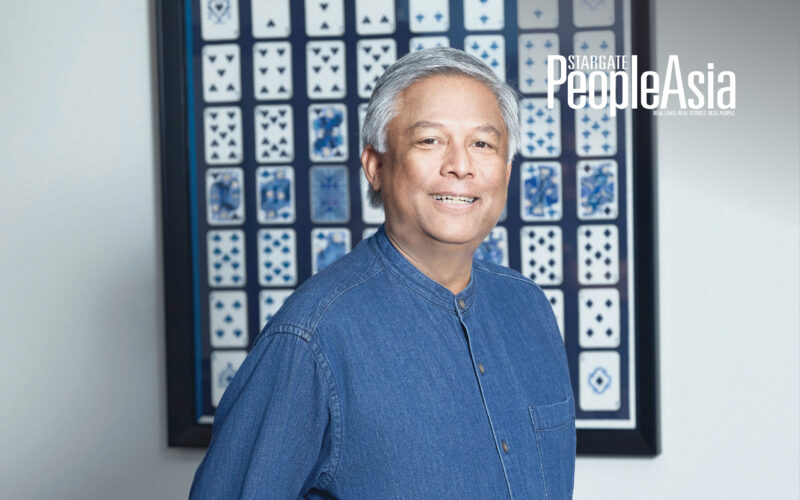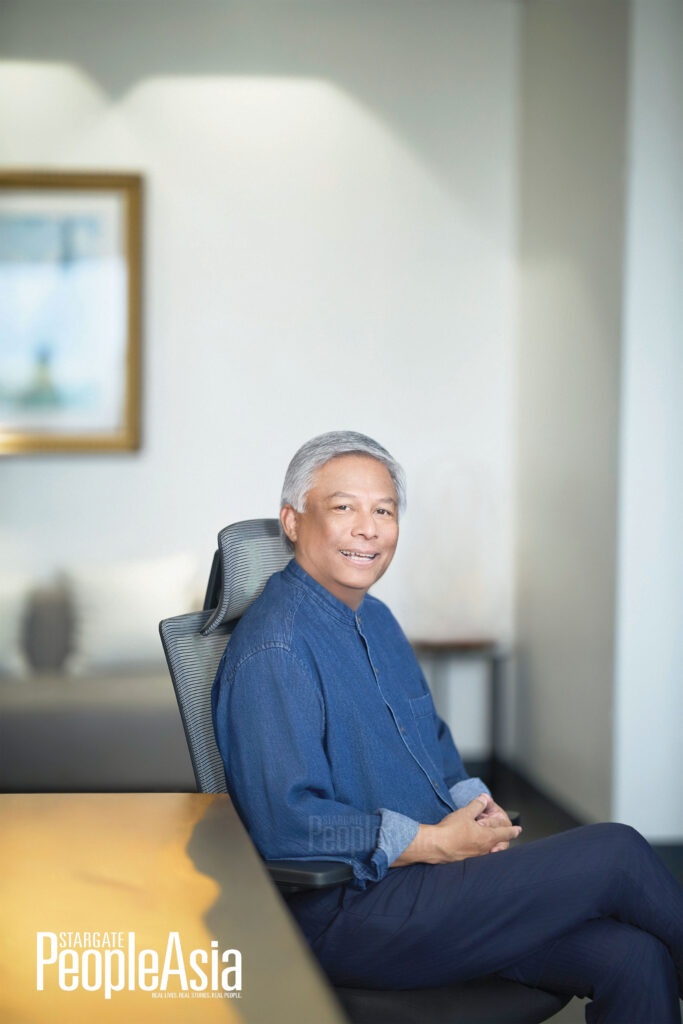Since assuming office in 2022 as the main man behind the country’s amusement and gaming sector, he has lost no time shaking things up, boosting PAGCOR’S net income by 53 percent, its revenues by 34.6 percent and its contribution to nation-building by 43 percent. But perhaps his best move yet is effecting change in entrenched “government mentality” by now giving emphasis to and premium on transparency, ethical practices and merit.
By JOYCE REYES-AGUILA
A firm resolve keeps Alejandro “Al” Tengco undaunted as he takes on the Herculean task that has defined his mission as a public servant.
The chairman and CEO of the Philippine Amusement and Gaming Corp. (PAGCOR) is not only implementing sweeping institutional changes that have transformed the agency and consistently delivered impressive numbers, but admits to have made the campaign to privatize PAGCOR his North Star.
In Tengco’s first full year in office in 2023, PAGCOR’s net income increased by more than 53 percent to P6.81 billion, according to the Philippine Information Agency (PIA). It booked P79.37 billion in revenues, 34.6 percent higher than in 2022. And a week before he sat down with PeopleAsia for an interview, the chairman turned over P5 billion to the National Treasury, making PAGCOR the first government-owned and controlled corporation to turn over its dividends to public coffers this cycle.
Seventy percent of PAGCOR’s revenue goes to the government, according to Tengco. “We fund the Presidential Social Fund that (the President) uses at his own discretion for social services, for people who are sick,” he says. “I’ve been here six quarters, and I’m happy that in every year, I’ve consistently contributed to the Presidential Social Fund.”
Aside from contributing to the Office of the President, Tengco is proud of PAGCOR’s financial assistance to many government agencies, including the Philippine Health Insurance Corp. (PhilHealth), the Dangerous Drugs Board, the Board of Claims under the Department of Justice and the Philippine Sports Commission.
“I am left with 27 to 28 percent of our gross revenue after taxes,” he continues. “We use that for our contribution to nation-building (or CNB).” According to a government press release last February, PAGCOR’s CNB increased by 43 percent from the previous year to P49.56 billion.
“We have four new infra (flagship) projects,” the PAGCOR chair reports. “We will build school buildings that range from one to three stories. The designs are not stereotypical. I leveled up the quality. There are proper lavatories, too. We have several socio-civic centers, places where people can converge. These can be venues to play basketball, for graduations or programs. On the second floor are offices. We are rolling out around P3 billion worth of civic projects this year.
“In the last administration, they planned to build 72 evacuation centers because of the pandemic then. But the term ‘evacuation center’ has a negative connotation. We have to change it (to multi-purpose centers) but not because I want to erase what they did.”
They can now double as revenue-generating events places, says Tengco. Under his watch, PAGCOR has already inaugurated about 50 percent of these infrastructure projects. His office will also fund e-learning centers, including some with 48 workstations and fiber internet connection for the central schools of various provinces.
The stakes
On the day President Ferdinand Marcos Jr. confirmed his appointment, Tengco recalls being told only one thing by the nation’s leader: “Galingan mo!” (Do well). “What I vividly remember is that he just went up to me. It was at a surprise birthday party for the First Lady (Liza Araneta Marcos). There was already speculation that I was one of those that he was choosing from. My name was being floated.
Mr. Marcos told Tengco that he believes he is “the right person” for the job. Tengco’s commitment to the President is that he will make him proud of PAGCOR, prove the detractors wrong and help Filipinos and the government significantly.
“(The offer was) very challenging,” he says of his decision to accept the post. “I came from the private sector. I have my own business (as chief executive officer and president of the construction firm Nationstar Development Corp.). Prior to that, I was in PLDT (Philippine Long Distance Telephone Co.) for a long time as executive assistant to president and CEO Tonyboy Cojuangco.”
At PAGCOR, Tengco experienced a few instances that exhibited what he calls the “government mentality” some public service employees are accustomed to. He was welcomed by a long line of officers from the elevator to his office on his first day; he didn’t like it, and it drove him to change and challenge the status quo.
“I am living with it and, believe me, I turned them around. They were not active at all. Today, they are proactive because of my transparency. Now, all my decisions, everything that I do, I report to them,” he says. Tengco now holds a weekly “Chairman’s Time” where he presents his activities and discusses his activities of the past week. He also changed the reporting format (in the Executive Committee) to make topics easier to understand.
“They love it,” he shares of the feedback. “They were just awed. I wanted all of them to learn what was being reported,” he says. “The leadership of transparency is all of a sudden clicking with PAGCOR.” Tengco is banking on the same transparency to privatize the gaming regulator. “This is the biggest challenge,” he admits. “I have been going around in conferences worldwide telling everyone why I want to privatize the operations of PAGCOR. The President is 1,000 percent behind me. I will not let this go. If I am not able to do this change now, it will never happen. It’s now or never.”
Tengco admits that the plan is “controversial,” as some 6,000 employees of the agency will lose their jobs once it is privatized. “PAGCOR is wearing two hats today,” he explains. “One as a regulator — issuing licenses, monitoring, making sure everybody’s compliant with rules and regulations. Second, it is also an operator running casinos — 27 percent of which are fully owned, and the rest are in joint ventures with private (partners). That is against Business Ethics 101. You would tend to be biases toward what you own.”
He says it is “very unethical” for integrated resorts to invest $1billion over a period in the country but have PAGCOR casinos less than one kilometer away from their locations. The patronage is strong for the branded casinos that integrate dining, shopping, hotels and even rewards points in their offerings.
And Tengco admits that the poor condition of PAGCOR casinos has not been good for business, as their contributions to the agency are down to only 17 percent from 100 percent in their golden days.
“I’m giving myself until late 2025 or early 2026 to strive for privatization,” he says, adding that he has committed a special early retirement package to the 6,000 employees who will be impacted. “All safety nets will be provided.” He assures qualified employees that there will be plenty of employment opportunities for them from would-be owners of PAGCOR casinos, post-privatization.
Tengco also holds regular dialogues with groups of 80 individuals per session. PAGCOR currently has 10,000 employees, with 4,000 having corporate positions.
The chairman wants his people to understand that the leadership style he introduced is “based on what is right then and what he thinks is right today.” He insists, “I will continue to lead with those principles. Primarily, my vision is to be able also to mold the employees so they can level up. I will make sure that I will protect rights. I will give a break to people who are deserving. And, of course, women. Women will play an important role in PAGCOR. And if they are excelling, we will make sure that they are recognized so that they can inspire people to work harder and make them believe that they have a chance.”
Under Tengco, PAGCOR is also implementing the Compensation and Position Classification System performance process that has resulted in an increase in the basic salary of employees. Additionally, all PAGCOR employees now report to only one office, after being in three separate locations. The agency also changed its logo.
“I wanted an entirely new image for PAGCOR,” Tengco maintains. “It was asleep for a long time, I’m sorry to say. I discovered that there were about a thousand licenses going around that were fake. And in the reports I got, even in Europe, the license was being used. It was time to change. We chose a logo that is a beacon of hope, a new beginning.”
His ace
It’s not all due to luck, Tengco asserts. “I was given a chance by God. We’re going to try our best so that PAGCOR will be really something that we can all be proud of. And I know I am getting strength from the one up there,” he tells us.
Tengco and wife, Carla are devotees of Our Lady of Manaoag. The PAGCOR chief travels to the Blessed Mother’s Pangasinan shrine monthly. He has personally donated a community center and lavatories to the church as thanks for the blessings and healing their devotion has granted his family.
Prior to his return to government, Tengco led the contractor firm that refurbished the National Museum of Natural History, the Department of Finance Building and the biggest sports stadium in central Visayas, the Toledo City Sports Center. He also served as vice mayor of Malolos, Bulacan from 1988 to 1992.
Tengco’s focus for now is augmenting the government resources to help the country. “We’re in the sweetest spot now for the gaming industry in Asia-Pacific,” he says, adding that the global industry knows how open the Philippines is to big investments. His office has received officials from the Japan Regulatory and Gaming Commission and city hall officials from Osaka, Japan — all seeking advice and collaboration on how to regulate Casinos.
“The industry is growing, and, modesty aside, PAGCOR has a different image and is professionally run,” he continues. “When I purged the illegal POGOs (Philippine Offshore Gaming Operators), there were 298 of them. Now, there are 70, including this new kind of BPO (business process outsourcing) that I set up that serve the big casinos in Europe, generating jobs for Filipinos.
“In terms of revenue, the highest revenue of POGOs was in 2019 when there were almost 300,” he declares. “They only gained P7.2 billion. Today, we only have officially less than 50, excluding the BPOs. In 2023, we generated P5.3 billion. This year, I am (forecasting revenues of) P6.5 billion, even though there are 25 to 30 percent less POGOs. We will be on par with their collection.” When asked if he plans to run for public office anew, the PAGCOR chair takes a long pause.
“No,” he firmly says. “If I’m able to finish my term here, I’ll be 68. They say 65 is not the retirement age anymore. It’s now 75. I want to go back to the private sector. I think my experience here is already a very good experience in public service.
“They say you should quit while you’re ahead. I think many people will be happy with what and how PAGCOR is when I finish my term in 2028. It will be an agency that the government can truly be proud of,” he concludes.
Photography by RAP YU
Art direction by DEXTER FRANCIS DE VERA






